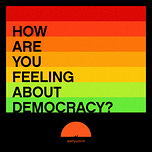Donald Trump epitomizes DOG WHISTLE POLITICS.
That’s the verdict of Ian Haney López, author of the groundbreaking book of that title that exposes the electoral strategy that has driven the Republican Party’s success in taking over the Supreme Court and engineering massive wealth inequality in the United States.
But we rarely hear anyone talk anymore about how Trump deploys racism to engineer massive gains for his billionaire friends at home and abroad.
Part of that is that the left takes Trump’s racism for granted, believing it’s visible to anyone who cares to see it. Another part is Trump’s mastery when it comes to silencing the press and critics about his divisive smears by using what Haney López calls “Racist Theater.”
And maybe the biggest reason is Democrats remain afraid to confront Trump’s purposeful divisiveness directly.
Haney López, who is also the author of MERGE LEFT, which presents proven tactics for using a race-class narrative to oppose strategic racism. In that book and this interview, he presents a better way to defeat the favorite trick of America’s bloated, belligerent billionaires.
Plus, he gets really pissed at JD Vance.
Catch up on all the episodes of “How are you feeling about democracy?” here.
If you want to be a supporter of this podcast, please join us here at the earlyworm society – free or paid, your support matters.
*************
ROUGH TRANSCRIPT
Jason Sattler: It's great to talk with you again, Ian Haney López. Your work is fundamental for understanding anything that's going on in politics these days. How does Donald Trump fit into the tradition of Dog Whistle Politics?
Ian Haney López: I think Donald Trump epitomizes Dog Whistle Politics. So let's step back for a second. What is Dog Whistle Politics? It's both old and new. It's old in the sense that it's one of the oldest, most dangerous forms of politics. It's pure demagoguery. It's an effort to stampede the population stories of fear and threat and animated by hatred against other people in society. It's very old. We've seen this across the centuries. We've certainly seen this in Europe. This is the demagoguery that gives rise to fascism. At the same time, it's new. Because something happens in the late 20th century, which is that society as a whole in the United States, but also Western society more generally comes to understand that and sexism are morally bankrupt. They're offensive. They're wrong. And that means that people engaging in demagoguery need to find a technique whereby they can stimulate racism, sexism, homophobia, transphobia, prejudice against different religions, that they can stoke all of that, while pretending that's not what they're doing, and also, and this is important, the people that they're stampeding with these fears, that they're not reacting out of base hatreds, instead are defending high principle. That's Dog Whistle Politics.
So somebody like Donald Trump comes along and he says, they're rapists. It's an invasion. They're poisoning the blood of the country. And I think a lot of us. As critics standing outside of his base can hear that and say, "Wow, this is demagoguery. Wow. He's really trying to stoke anger and hatred and fear and a sense of victimization." But if you're within his target audience, what you're hearing is not, hey, I'm a racist and you're a racist and let's support each other. What you're hearing is, "Hey, I'm a patriot. He's a patriot. He wants to defend the country. He wants to protect people. He likes good people. He doesn't like bad people, right?"
And that's Dog Whistle Politics. It's a strategy for simultaneously the poison of prejudice into American politics, and then denying that's what you're doing and reassuring your base: when you support me, you do so because you're a good person. You do so on the basis of high principle. It can be patriotism or love for your community or actually wanting to take care of good African-Americans and good immigrants, right? Like all of that. But we know as critics sitting outside of it, this is just a cynical strategy. It's a technique for a modern version of dangerous demagoguery.
Jason Sattler: And this is the part that always kills me and doesn't get talked ever enough, but who benefits in America from Dog Whistle Politics?
Ian Haney López: Certainly not most Americans. I think that should be really clear. There is really a series of interlocking crises in the United States that is engulfing the lives of most people, and that makes them more susceptible to a fear-mongering story that tells them who they should blame. And these interlocking crises are, first and foremost, increasing social division, rancor, and violence. But also an economy in which we've seen most of the wealth of the country shifted away from the from working people, working class and middle class alike, and shifted up into the economic stratosphere into the pockets of billionaires. And also increasing levels of government violence against impoverished communities and especially communities of color and also the sort of, the arrival of dramatic examples of extreme weather and these harbingers of climate collapse while still having a government that refuses to act aggressively against it. So all of these interlocking crises are there.
What's their connection to Dog Whistle Politics? It's not coincidence. It's actually cause and effect. Dog Whistle Politics was the strategy, is the strategy of the party that used to call itself the party of big business. That is, Dog Whistle Politics, the strategy of stampeding voters on the basis of group hatred. That is a strategy adopted by people who want to rig government for the oligarchy, who want to rig the economy for themselves, to reduce the amount of regulation, to reduce protection for labor, to reduce the amount of taxes they pay, to reduce regulations to protect the environment and the water and air. And their strategy for doing all of that is not to come to the voters and say, "Hey, we believe in rule by the rich and you should too." That would be to tell the truth about what they're doing. Donald Trump, billionaire, rigging the economy for his rich self and buddies. That would be to tell the truth about what they're doing. Instead, what they do is they come to the public and they say, "Hey, you're under threat from your neighbors because they're gay or they want an abortion or they're a minority or they don't respect Christendom" or whatever the crap is that they're selling the strategy of the ultra wealthy of the ultra powerful get us pointing our fingers at our neighbors, fearing and hating our neighbors. we won't notice the way in which it's the billionaires really rigged government and the economy for themselves at tremendous cost to the rest of us and to the global climate.
Jason Sattler: Inherent in that is a fantasy of persecution. Since January 6th, we've really seen the master of the strategy of persecution. How have you seen it through your eyes?
Ian Haney López: This is an updated version of demagoguery that emerges in the United States in the fifties and sixties. The groundwork for it is laid in different parts of the world in different ways, but it's important to understand that social change creates opportunities for cynical politicians to exploit social hatreds. And, okay, that's a little abstract. Let's make it more concrete. In the United States, in the 1950s, you had most white Americans confronting the reality of racism in the country and in doing so drawing upon the recent experiences in Europe, this was really a moment when Western society in American white society came to understand that racism was horrific and immoral.
They could see it most clearly in. The Holocaust in this mass industrial scale genocide against the people and then in the 50s and the 60s through the courage of the African American civil rights movement, white Americans were pushed to confront the same sorts of horrors from the genocide associated with Native Americans, but also with slavery. To the current practices of formal racial exclusion, degradation, and humiliation of Jim Crow. And when confronting that there was a very important cultural shift. Most white Americans came to see white supremacy as grossly immoral. And that in turn, by the mid 1960s, led to very important civil rights legislation promoting integration in schools, integration in the workplace, and an effort to reform exclusion of our voting system so that we might actually become a democracy. In which all people had an equal chance of voting. Those are really important changes. Now, in the midst of change, always there's a time of anxiety and uncertainty what's happening here. Which way are we going? What just shifted under my foot? I thought I understood the world one way, whites is superior, blacks is inferior.
Now you're telling me we're equal. What does this mean? In a period of insecurity and anxiety, what a democracy needs is a set of leaders who say, "Hey, we get it. We get that this is destabilizing, but progress sometimes requires discomfort. Let's move through this together. We're going to take care of everyone. We're going to build connections. We're going to build bridges. We're going to do repair work, and we're going to make sure that everyone's better off when we come through this progress process." Okay. That's what societies need.
But the moment of instability of anxiety also creates an opportunity for different sorts of politicians, the sorts of politicians who stand up and say, you're right you're anxious. And actually you're not anxious enough because we're in the midst of carnage. This is a disaster. There are rapists at your door. I, there are terrorists planting bombs on your trains, in your airport. You have no idea how much you're at risk, how much you're a potential victim, how endangered you and your family are, what are you doing? Go get some guns. That's the sort of politicians we got. And that's the model that Nixon followed. There was a version of it that Reagan followed. You can see it also with George Bush and Willie Horton and then with his son and the way in which 9/11 was politicized as some sort of a clash of civilizations that required the reordering, the restructuring of our society in terms of a fear of terrorism, the fear of immigrants. And you really see it in terms of Donald Trump. You really see him saying over and over again--and it's important to say, buttressed by right wing propaganda outlets like Fox News and One American Network--but saying over and over again to Americans, you're not scared enough. The predator is clawing at your door. You need to fight, fight. And I'm here to fight for you, right? Like that, that, yes, there are periods of change, periods of anxiety, periods when we need leaders who can say, "We understand changes is destabilizing can make people nervous, we're in this together, we're going to take care of everybody, we're going to come out of this together stronger by staying together." But we didn't have leaders saying that clearly and we can talk about why. And instead what we had was the rise of a leadership and the hijacking now of an entire party committed to the opposite approach, which is to say, you're not scared enough about change. We need to go back. We need to reverse all of this.
We need to reestablish the dominance of certain groups.
Jason Sattler: And you see the power of this because they're at the zenith of their success. They are more successful than their movement has ever been. They've achieved the one goal that no one thought they would ever do. They overturned Roe. Notably Donald Trump saw 2022 and blamed Dobbs for Republicans underperforming and said he's going to return to "states rights" when it comes to abortion rights, which is a rife term in Dog Whistle Politics.
But I'm not quite sure if I connect. Is that a dog whistle in itself?
Ian Haney López: States rights is a dog whistle in the sense that... Let me, I have to laugh. I teach constitutional law. I teach, which includes conversations about the appropriate balance of power between state and federal governments. And let me tell you, that topic is boring as shit. Nobody cares about the appropriate balance of governmental power between federal, state, county, local. Seriously, that's what you're going to use to, to organize campaign? That's a lie that, that people are up in arms because they're incensed about a sort of misallocation of power between state and federal. That's just a lie. What's really going on is that states rights provided a high principle sounding reason to oppose racial integration. That's where it comes from. It has deeper and uglier roots. When you look at the founding of the country, the United States was founded with a constitution that sought to preserve the right, the maximum autonomy of the individual states. Why did it do partly it's because these different colonies did want to preserve their autonomy. Colonies, now states in the Northeast, did want to preserve their autonomy, weren't sure if they could trust a federal government. But in largest part, this was part of a compromise with the slavocracy. The southern states, the southern colonies were not going to join a federal union if it threatened their capacity to continue as slave societies, right? And so states rights, from the inception, is fundamentally about race and gains its emotional power about race.
Now, once states rights, Passes into the political lexicon as this story that's we're opposed to excessive federal power. Then it becomes available to the right to use in different contexts. And they use it in the abortion context to say, "Hey, the power, the problem with the Supreme Court is that it's imposing national standards on the rest of society."
And again, initially, this is a story about race. "Supreme Court is saying we can't segregate our schools. Supreme Court is saying we can't freeze African Americans out of politics," right? And people are saying, "Oh, I'm not a racist. I just think the Supreme Court is excessive, is exercising excessive power on the part of the federal government, right?"
They, it's okay, this was actually something that George Wallace of the segregation today, tomorrow and forever. Like, he says that one year, the next year he says, I'm opposed to, excessive federal power. I believe in states rights. That, that's where this language is coming from. It's available to be used in the abortion context. It's available to be used as a statement that the federal government is trying to change all of society and trying to change the culture of states that are opposed to equality for women, meaningful choice for women, whether to carry or to abort a pregnancy, right?
That becomes available. Is the right in fact committed to states rights? I've already said it's hard to care about that in the abstract in practice, what we see especially in the, a sort of anti abortion is this desire to use federal power to make abortion illegal. Across the entire country. Like they're not opposed to using the federal government to mandate national standards, as long as it's. Their national standards. And likewise, when you look at red states, so states that have a Republican governor and legislature, what do they often do with their power? They often use their power to target the blue cities within their red states, whether that's Houston or Denver and Boulder over and over again, you're seeing, or Louisville over and over again, you're seeing red states use their state level power to trample on the democratic interests of blue cities. These are the people who claim they care about states rights? No, that that's a high sounding principle that they invoke, but really this is about culture war, power, reestablishing socially reviled hierarchies --sexism, racism, patriarchy--but claiming to do so on the basis of neutral principles.
Jason Sattler: And someone who really is expert at that is to me at least and you'll be the judge of that is the guy that Donald Trump has picked to be his running mate jD Vance who came out of this whole hysteria around the white working class that started in 2016 and used his very wealthy connections to rise quickly to the top of the Republican Party. I want to play an ad that he ran in 2022. This is when he became full MAGA.
Are you a racist? Do you hate Mexicans? The media calls us racist for wanting to build Trump's wall. Joe Biden's open border is killing Ohioans. With more illegal drugs and more Democrat voters pouring into this country, we will put America first.
Jason Sattler: And I played that not just to give myself heart palpitations , but because I think it's important to understand who he is and what this campaign could look like for the next few months. I think.
And he's expert at doing that in a way that presupposes the legitimacy that even Ron Howard bought into. I think it gets into something you call "racist theater," which I think is one another one of Trump's superpowers. Am I getting that one right? And what do you, what would you want people to understand about that ad?
Ian Haney López: I think you're exactly right and what you're, what the J. D. Vance ad does is it points out the way in which Dog Whistle Politics has evolved and evolved in a very powerful direction. So dog was a politics in the sixties, seventies, eighties, it was also regarded as morally suspect as tainted as cynical. And so a lot of the strategy behind dogs or politicians--I think about Ronald Reagan talking about welfare queens and whatnot--part of the strategy was to pretend that they weren't doing that at all and to really push back against the press or any sort of suggestion that they were. But that has shifted under Trump. What Trump understands is that if he can provoke the press, provoke the Democrats into calling him a racist, that actually helps him because he is telling a story to his base in which they are not racist, they are acting out of high principle, they're trying to defend. country and community and family. But one of the core claims that's being made on the right is that demands for racial justice demands for integration demands for affirmative action demands for diversity, equity, inclusion, that those aren't actually animated by a sense of justice, but rather they're motivated by a sense of revenge and a sense of hatred of white people. And in this telling the right is constantly saying to white voters, "People are racist against you. They blame you for things that you weren't responsible for. And they also think that you're racist just because you're white and that's racism against you." In that context, Trump and J. D. Vance understand that there's this kind of complicated triple move that they can make. They can say something outrageous flooding our country. It's an invasion. They're poisoning the blood of the country. That's move number one. Move number two, wait for people on the left to say, "Hey, invasion and caravan and blood of the nation. That's racist language. And then they respond to that by saying, I never mentioned race. I was just talking about immigrants. I was just talking about protecting our country and securing our border. That's move number two. I didn't, no racism here, nothing to see here. And then comes move number three. Then they go on to say, but Hey, wait a minute. You just accused me of racism. And that's the real racism. You're racist against me by thinking that I'm a racist, even though I'm just trying to protect the borders. And you're not only racist against me, you're racist against all my supporters. And that's the move that JD Vance is making. And it, it marks this evolution in Dog Whistle Politics as part of why dog whistling is important. Now is so extreme and so obvious to so many of us. I can't tell you the number of times I'll field the call from a journalist or read a pundit who will say, "It's not dog whistling anymore. It's a, it's a naked train whistle of racism. It's so obvious that no one can deny it. What they're reacting to is the fact that the sort of dog whistling that is being promoted or being employed on the right is designed to trigger accusations of racism from the middle, from the left. It's designed to be obvious to the rest of us. Because when we respond by just saying, oh, that's bigotry, it allows the right to say to its base, I told you those lefties, those Democrats, those liberal elites, they are condescending towards you. They are racist towards you. They think that when you want to secure the border. You're actually a bigot. And so we're on the same side here. Trust us. We'll defend you against those liberal bigots. Those left wing bigots the Black Lives Matter, the DE& I, because all of those are motivated by anti white racism. Whereas when we oppose Black Lives Matter, when we oppose DE& I, when we oppose the 1619 project, we're not doing it because we're racist. We're doing it because we're racist. We're doing it because, wait for it, we're anti-racist. We oppose affirmative action because we oppose racism. We opposed 1619 Project because of its racism against white people and we're anti racist. We oppose affirmative action because it's racist and we are anti-racist, right? That's the move that the right has made. It's a long time coming. This framing starts in the 1980s in the way in which affirmative action was changed from an effort to integrate America to on the, in the language of the right, a form of discrimination against white people, right? Like it's the groundwork is there. This has been decades in the making, but on the right. Or rather for at least 40 percent of Americans, it is now common sense that efforts to promote a group of quality. Are not actually rooted in justice, but instead are rooted in revenge and in themselves in group hatreds, right? So whether it's trying to promote racial integration or trying to promote a gender equality or trying to promote acceptance of lesbian, gay, bisexual folks, like all of that... The idea of for 40 percent of Americans is that's not rooted in justice. That's rooted in hatred. Hatred of who? Hatred of white people, hatred of men, hatred of people who embrace traditional families, hatred of Christians, right? That makes sense to 40 percent of Americans. And so that's part of the politics that we're living with now. We've got dogs of politics operating this complicated way in which it's designed to stoke division, it's designed to be offensive to, frankly, half of us or more, but then to harness our outrage as proof of our supposed bigotry and the supposed victimization of the other half of the United States.
Jason Sattler: One key concept is plausible deniability. We think everybody sees this Trump that we see.
He still backtracks on a lot of things. He said "bloodbath." He pulled back from that pretty quickly. Why did he back off Project 2025? He gets that there is a layer that protects him in that last key amount of votes needs to believe they are this good person and even if they've thought in the past that he wasn't a good person. This is why I think they keep picking this fight about Charlottesville. It's hard because we know that we're supposed to stand up for racism whenever we see racism but also it's so easy to fall into being the the bit player, the supporting actor in the racist theater drama. So how do we avoid that?
Ian Haney López: I think that we absolutely have to denounce racism whenever we see it, but we have to be careful what sort of racism we're denouncing. That is, we have to be more clear on our own analysis, right? I think the left is falling into, is playing, its assigned role in right wing racist theater when it continually denounces white supremacy and when it makes no distinction between the white supremacy of a Stephen Miller or Steve Bannon or Donald Trump and the white supremacy of supposedly the majority of white people. That's a disaster. It's a disaster in all sorts of levels, but let's, stick with the analytical. It is just not the case that the majority of white people consciously embrace white supremacy. That's just wrong. Analytically. Our best evidence suggests it's something between four and 8 percent of white people embrace neo-Nazis and the Klan. That is a very big number. That number has doubled since 2016. It's huge. It's worrisome, but even at the outside, 8 percent is not the majority. It's a notable troubling minority, but that's less than one in 10. So let's be very clear about that. That is not to excuse the majority white voters. I think the majority white voters, and frankly, A very large proportion of voters of color as well have internalized racial stereotypes and fears. And unconsciously can have those fears and stereotypes triggered. Notions of, that whites are innately good, and that African Americans are innately bad, or that Latinos are innately lazy or violent, right? Those sorts of stereotypes at the cultural level, Have been unconsciously internalized by almost everybody in this society and they're out there and they can be triggered. That is very different than saying, " Hey, we're a nation in which the majority of white people are self conscious bigots that they know themselves to be bigots and they're voting or they're like very different."
Okay. So now we've got two different kinds of racism on the table. You've got the sort of self conscious, self aware bigotry and hatred of the white supremacist. You've got the unconscious racism that afflicts almost all of us, but that almost all of us can develop techniques and strategies for dealing with. And now let me put a third on: strategic racism, using racism as a strategy to go after something else, power, wealth, electoral victory. That's the sort of racism we ought to be talking about whenever we're talking about Donald Trump, Steve Bannon, Steve Miller. They are, I think Bannon and Miller, they are themselves white supremacists, but also they're strategic racists. They are using racism as a strategy to divide and conquer as a strategy to tear us apart. And so when we look at Trump's remarks, Trump's constant racist provocations, and then he walks it back and he's, Technically I didn't say that. And yes, I said, there's 'very fine people on good on both sides.' But later I said, but this doesn't apply to the neo Nazis and the white nationalists. So technically..." We make a mistake when we respond to all of that by saying you're a white supremacist and so are your followers. We would be much better off and much more accurate analytically if we said, "Trump, we're onto you. You're a carnival barker. You're a fraud. You're a charlatan. And your weapon of choice is racial division and you spread racist lies in order to stampede people in their fears and in their insecurities so that they'll turn on each other so that they'll support you and not notice the way in which you're just like a huckster billionaire who's been sued 4, 000 times or whatever, 2, 000, whatever it is, right?" That's the way we ought to be talking about racism all the time.
J. D. Vance, what a piece of shit, right? Like he, like his trajectory, he's a never Trumper when he thinks that's the route to power. He becomes a MAGA bootlicker when he thinks that's the route to power. He is the epitome of a strategic racist. He looks around and he says, how do I win power? How do I suck up to Donald Trump? Oh, I'm going to put out this really racist ad. That it that then like plays into this racist theater and this is going to work for me. Did he say to himself, " I'm really worried about all the damage is going to do to our society"? I don't know. Maybe he did, but he certainly ended up saying, "But I don't care. I'm going to do it." Because this is racism as a strategy. And again, to be clear, what is the strategy? Put Americans at each other's throat so that we feel that we're unsafe, that we can't trust our neighbors, and that we need a strong man, an authoritarian, who's going to take the side of us and our group. And then in turn, what we're doing is we're supporting these politicians whose deepest allegiance is to power and wealth.
Jason Sattler: It's incredibly powerful message. I was going to get a bit into the current political dynamics, but it seems like this is more of a conversation that I think can stand beyond this. And, we're going to have a campaign eventually. And there's going to be a nominee.
Chances are, it's probably the nominee that's likely, but it could also be the first African American, first biracial vice president, which doesn't get talked about very much anymore. But, I don't getting into all that seems a little too fraught at this point, because I think we just it's so much speculation and fantasy football.
But I do think, initially, the thing happened where President Biden met with AOC and Bernie Sanders. And, they're very they're with him, and they wanted him to put out 100-Day policy roster and it was just a roster of very working-class focus policies. I wonder what you thought about that and if you're not a political strategist for a living, but how would you give him the rhetorical strength to take on this kind of extremely powerful, and more ignored than ever, dog whistling? I think that you don't people don't even really talk about they take his The racial signaling for granted nowadays.
Ian Haney López: Yeah I think Democrats are making an enormous mistake and it's, it was evident in the debate, but it was hard to see because you had Biden's evident decrepitude. And Trump's evident lying and those became the main talking points. But if you could look below the surface to both can of both candidates and look at the substance of what each was saying, Trump wove anti-immigrant fear mongering into virtually every answer he gave, right? So virtually everything Trump said in terms of the debate, and this is modeled in his campaign rallies. What followed a single theme, "Immigrant predators are clawing at your door."
Biden, if you look below the surface and focus on the substance, tried to provide policy arguments and numeric evidence in just about every answer he gave we're going to save you so many dollars on Medicare.
If you just think about that in terms of campaign conversations to have with the American voters on one channel, you have the predators clawing at your door, predator three, right? Be afraid, be very afraid. And on the other channel, you have Washington Week in Review. And here are these policies that I really do think will benefit you. Listen, good luck with that.
If people think that their lives and the lives of their loved ones are in danger, they're going to respond to policy by saying, "Yeah we'll get to that later, make me safe now, we'll get to policy later," and the Democrats are making a huge mistake by trying to say, "Well,, we're going to run on Biden's record. He's accomplished so much and we're looking forward to staying the course and accomplishing even more legislatively."
Now, I think that Democrats come closer when they say we need to run against Trump as an existential threat to democracy, right? Because at least they've shifted to the language of " Hey, there's a lot at stake. Your security, your family security, the future of your children. There's everything's on the table here."
That's helpful. I don't think that's enough. I think that the strategy of the Republicans, and it's a very good one, is to create a rhetorical mud puddle out of everything. So if Democrats say Trump's a threat to democracy, the Republicans respond by saying, " Biden's an authoritarian figure," okay dah, back and forth.
I think the stronger argument for the Democrats to make, and this is backed up by research, backed up by message testing, but the stronger argument Democrats need to make is they're trying to divide us. This is not who we are. We are not a people who want to tear each other's throats out. We're a people with a shared sense of values and hopes, and it's only because they're using lies to stoke fear and division. That we're turning against each other. If we turn against each other, divided, we fall. If we pull together and reject their lies, we can take care of all of our families. And to really explain to people in very simple language, the strategy behind all the fear mongering, the strategy behind the racism, the strategy behind the sexism, the strategy behind the transphobia. So that people can understand, "Oh. All of these warnings about immigrants, or about trans people, or about abortion on demand, that's not just that issue. This is part of a larger pattern in which these billionaires are trying to divide us so they can laugh all the way to the bank. Whereas, We believe in America. We believe in all of us. We believe in the project of creating a society in which everybody can thrive and everybody has meaningful individual liberty and freedom, right?"
The story that the left, that the Democrats need to tell. I worry that they are too afraid to tell that story. They're too afraid to really take on what the right is doing, because that constantly returns the conversation to the right a conversation about inclusion, a conversation about anti racism, about anti sexism, about fighting homophobia, about fighting religious xenophobia, it constantly makes that the conversation, and I think Democrats feel that if the conversation is about these big cultural shifts that they're going to lose.
And what they don't understand is if they don't talk about the fear and the lies, and if they don't depict a vision in which we're going to take care of each other, and we're all going to be better off together, that's when they're going to lose.
















“Trump's racism as a strategy” with Ian Haney López